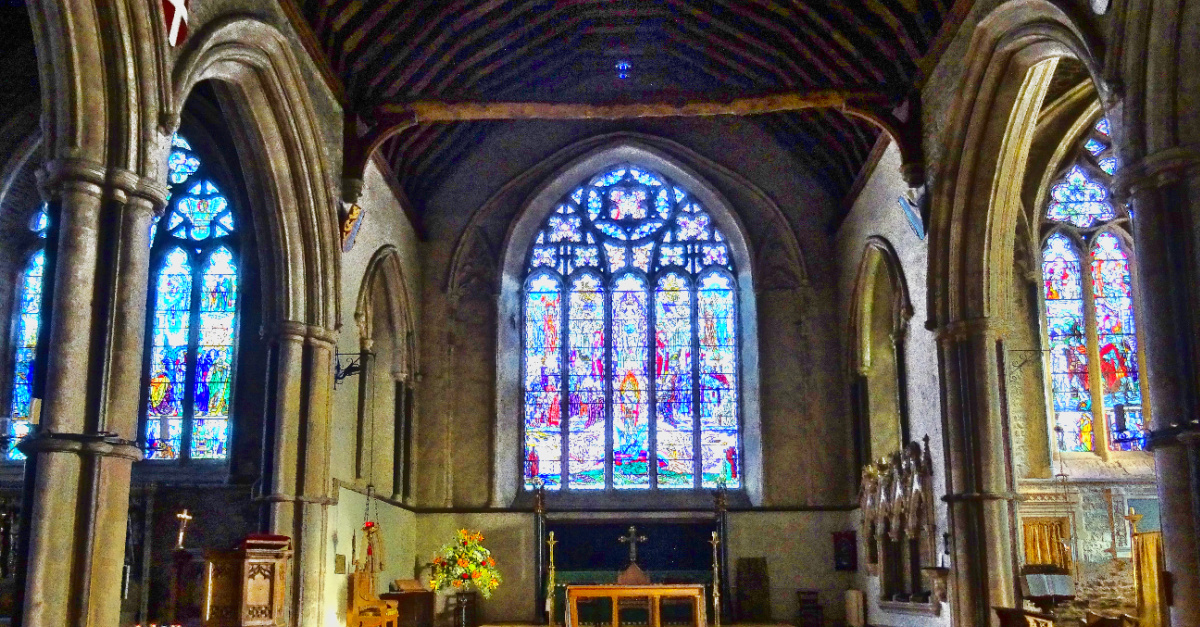The readings today at St. Matthew’s (and every other) Episcopal church were Isaiah 65:17-25 and Luke 21:5-19.
What an interesting pairing.
Isaiah’s words are all about the future bliss of Jerusalem where pretty much everything that can go right does and everything that can go wrong doesn’t.
There will be no more weeping or cries of distress; no more infant mortality but longevity for all; freedom from enemy attacks and hostile takeovers; descendants will be blessed, and before they even have a chance to speak, God will hear them and act.
In fact, Jerusalem’s future will be nothing less than a return to Eden where wolf and lamb, lion and ox, will be at peace, but the “serpent” (who tempted Eve in the original Garden of Eden) will pose no threat: he will be consigned to eating dust from the outset.
Thus spoke “Deutero-Isaiah,” the anonymous exilic/postexilic prophet, who envisioned a glorious future for Jerusalem. In v. 25 he echoes the words of the 8th century prophet Isaiah in 11:6-9, where the promise of the animal harmony was to have been a mark of the Davidic monarchy. Now, many years later, the role of the line of David is not so certain.
Still, the hope for Jerusalem’s glorious future remains intact, although no longer tied to monarchical rhetoric—now it is about a renewal of creation itself (v. 17), a new Eden.
But this future vision is not realized.
Jerusalem will labor under the yoke of foreign kings, first Persian, then Greek, and then finally Roman, at whose hands the Temple is destroyed and Jerusalem’s habitants are either killed or scatter.
We must remember that Old Testament prophecies do not always come about, not because they are failed predictions, but because they are not primarily hard-and-fast predictions at all. They are “conditional promises,” visions of the ideal, of what God desires, of what can be, not of what will invariably be.
Which brings us to Jesus’s words concerning the destruction of the Temple in Luke 21. (Yes, I believe these “end-of-the-world” speeches in the Gospels pertain to the destruction of the Temple in A.D. 70—feel free to disagree.)
Jesus’s vision for Jerusalem’s future couldn’t be more different from Deutero-Isaiah’s. Jesus describes the impending destruction of Jerusalem. In classic prophetic exaggerated (yet still realistic) language, Jesus speaks of wars and insurrections, nations and kingdoms rising up against each other, earthquakes, famines, plagues, heavenly portents. And Jesus promises persecution, death, and hatred for his listeners.
Deutero-Isaiah’s future vision of Jerusalem was bliss, paradise, a new Creation. Jesus’s reality was, “. . . the days will come when not one stone will be left upon another; all will be thrown down” (v. 6).
I know how this tension is typically handled in Christian theology: Isaiah wasn’t wrong at all. His words were intended, if not consciously by him then by God who inspired the prophet, to refer to a different sort of “fulfillment” that can only come with Jesus. [Whew. Crisis avoided. The Bible really does speak with one voice.]
I have no trouble with saying that Isaiah 65 came to be interpreted as “ultimately” fulfilled in Christ. But try telling that to the postexilic Jews. More important, to make the case that Isaiah 65 is actually about the collapse of Jerusalem and the Temple in order to make way for Jesus simply sidesteps the tenor of Israel’s theology, which was very much centered on glory of Jerusalem and of the Temple.
As with most things we see in the New Testament, the destruction of Jerusalem and the Temple is a “surprise ending” to Israel’s story.
I would rather look at this tension the way I heard it in church today, as a dance between despair and joy in the life of faith.
Sometimes things look one way—glorious, hopeful, surely a certain and true blessing of God. And keep in mind that Deutero-Isaiah and the other postexilic Jews had every right to lay claim to such a hopeful future: Jerusalem was God’s city and the Temple was God’s house, and thus would surely triumph.
To think otherwise would be to charge God with unfaithfulness to God’s promises; to accuse God of sleeping, lying, forgetting, or just not able to come through.
And yet Jerusalem and the Temple were razed and the people scattered or were massacred.
Even when we think we know what God will do—what God must do—we never actually really know. And in the meantime, we dance between joy and despair in this life of faith, where we are always learning to try to trust God rather than trusting in what we think God is doing or must do.
This blog was first posted in November 2016.
***In The Bible Tells Me So (HarperOne, 2014), I deal a lot more with the messiness of the Bible and how that reflects our own spiritual journeys. In The Sin of Certainty (HarperOne, 2016) I spend a lot of time talking about how needing to be certain about what God is up to cripples faith rather than supports it.***




























![[Video] More – Aghogho » GospelHotspot](https://gospelhotspot.net/wp-content/uploads/2024/04/More-Aghogho.jpeg)
















